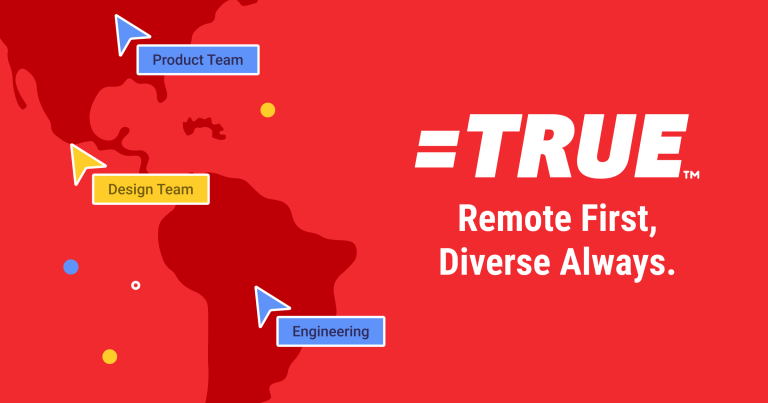In today’s rapidly changing work landscape, remote work has become increasingly prevalent. What began during the pandemic as the only way to keep the company in business has quickly been embraced as a way to realize many individual and business priorities. And as teams everywhere adapt to this new normal, leaders have found themselves struggling to find a methodology that works across the entire organization.
To echo the obvious…the ability to collaborate effectively as a remote team is crucial for success. Remote work team collaboration brings its own set of challenges, such as language barriers, different time zones, and limited face-to-face interaction. However, by implementing a methodology that emphasizes team Standards, Thoughtfulness, Agility, Autonomy, and being Reachable, organizations can overcome these challenges and build strong and productive virtual teams. At EQUALS TRUE we call this the S.T.A.A.R. Method for Remote Team Collaboration.
This methodology came from years of experience managing remote team collaborations for clients (well before the pandemic) and analysis of those interactions. Our observations were not exclusive to software development teams. They also included design, marketing, operations, and human resources teams from various industries. The S.T.A.A.R. Method is also (as you may have surmised from the name) bespoke for organizations that have a commitment to maintaining a safe + inclusive environment for all their employees.
Standards: Setting the Foundation for Team Collaboration
Establishing clear upfront team standards is imperative for successful remote work collaboration. This includes defining expectations for communication, responsiveness, project pace, work quality, and performance metrics. When team members have a common framework of how collaboration should take place, it creates a sense of unity and alignment. By clearly outlining these standards, remote teams can shortcut the collaboration speed bumps and more quickly find their stride. Ensuring that everyone is on the same page and working towards common objectives and goals.
Thoughtfulness: Active Listening for Effective Collaboration
In a remote work environment, it’s crucial for team members to form a rapport. This is key to establishing the long-term trust required for high performance, or highly effective, team outcomes. So when establishing team collaboration, making certain everyone feels heard is step one. Thoughtful (active) listening is important because it’s a genuine way to show your team members that you value what they say as well as the role they perform. In addition, studies have shown active listening can help you more fully absorb what others are sharing and provide meaningful contributions to whatever the conversation may be about. Thoughtful listening communicates the essential ingredient for any successful relationship or collaboration. Respect.
Agility: Iterative Communication for Growth and Improvement
Feedback is a powerful tool for remote teams to enhance collaboration and drive continuous improvement. Encouraging a culture of constructive mutual feedback (yes managers this means you as well) within a safe environment allows team members to provide insights, share ideas, and address challenges. Within the classic Agile iterative framework is a process that can benefit any team…technical or not. The Daily Standup meeting combined with the Start, Stop, Continue, and Improve framework of Retrospectives is an easy to adopt powerful feedback & collaboration model. Remote team members should feel comfortable giving and receiving regular feedback from peers and leaders, as it helps identify areas for collective growth and improvement. By embracing Agility as a core practice, remote teams and organizations can create an environment that promotes learning, innovation, and collaboration.
Autonomy: Trusting, Empowering, and Equipping Team Members for Success
Real team autonomy is only ever achieved through empowerment, trust, knowledge, and resources. Hold back on any at your own peril. Empowering remote team members begins by trusting on day one that the other individuals take ownership of their work and make decisions that will benefit the project and team. Team empowerment is strengthened and affirmed by freely sharing knowledge within the team. Your objectives, goals, OKRs, and other metrics should be clear and understood by all. Remote teams should also make providing the necessary resources, tools, and support to enable team members to perform at their best a top priority. These practices encourage autonomy, engagement, and safety within organizations as well as create a sense of ownership and accountability. All of which leads to increased collaboration and productivity.
Be Reachable: Plugged-in, Engaged, and Available to Collaborate
I’ve never known anyone who appreciates the feeling of being ignored. And regardless of the reasons or rationale for not being timely in your communication that is exactly what a person communicates when they are not reachable. In a remote work setting, it’s essential to establish effective communication agreements to facilitate real-time discussions, document sharing, and project management during established work hours. By having clear and accessible communication agreements, remote team members can more effectively collaborate and enjoy timely decision-making. Being reachable means being responsive and accessible when you are supposed to be working. This will help build trust and appreciation for individual contributions besides just making the day more productive for all.
Effective remote teamwork and collaboration rarely happen organically between strangers. They require a deliberate and proactive approach. However, by prioritizing Standards, Thoughtfulness, Agility, Autonomy, and being Reachable (S.T.A.A.R.) your organization can accelerate its path to these goals. The methodology will scale to any size team and help unlock the full potential of a remote workforce. Remote team members bring enormous opportunities for innovation, productivity, and success through newfound team diversity. By consistently nurturing these principles, organizations can create a culture of collaboration and team dynamics that all can be proud of being a part of each day.
– Jason Elkin
(Jason Elkin is the Co-Founder and President of EQUALS TRUE. For more information please visit https://equalstrue.tech)
Copyright © 2024 EQUALS TRUE. All Rights Reserved.





